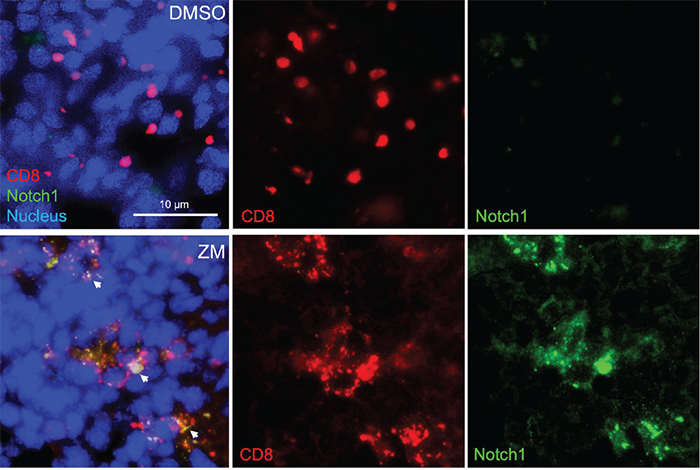Study Reports Blocking Key Enzyme Boosts Anti-Cancer T-Cell Responses and Resistance to Immunosuppression
August 29, 2022

“Immunotherapy is one of the most promising areas in oncology,” notes senior author Lucio Miele, MD, PhD, Assistant Dean for Translational Research at LSU Health New Orleans School of Medicine, who is also a cancer researcher. “Our immune systems are capable of destroying cancer cells, and several approved and experimental drugs stimulate cancer immunity. But cancers fight back, producing substances that weaken immune cells.”
The immune system cells that kill cancer cells are called CD8 T-cells. To be effective, CD8 T-cells need a protein made by the NOTCH1 gene.“We had already described how adenosine, an immune-suppressive substance released by tumor cells, causes the breakdown of NOTCH1, weakening T-cells,” says Dr. Miele.
Using a proteomics strategy, the LSU Health New Orleans research team led by postdoctoral researcher Giulia Monticone, PhD, determined what causes the breakdown of NOTCH1 in T-cells. It is an enzyme called CBL-B. Collaborating with a Massachusetts biotech firm that is developing CBL-B inhibitors, the scientists were able to show that their experimental inhibitors do protect NOTCH1 from breaking down in CD8 T-cells and make them far more effective in killing breast and colorectal cancer cells.“When added to existing immunotherapeutics, these CBL-B inhibitors greatly increased their potency,” Dr. Miele adds. “This new strategy could expand the efficacy of cancer immunotherapy by making patients' T-cells able to evade the immune-suppressive defenses of tumors.”
Co-authors also included Drs. Deniz Ucar, Fokhrul Hossain, Salome Ibba, Hamid Boulares, Zhi Huang, and Samarpan Majumder at LSU Health New Orleans; Drs. Fred Csibi, David Ciccone, Silvana Leit, and Christine Loh from Nimbus Therapeutics; Dr. Ameya Champhekar from the University of California; Jermaine Austin from the University of Virginia; Dr. Nick Carpino from Stony Brook University; Dr. Keli Xu from the University of Mississippi Medical Center; and Dr. Barbara Osborne from the University of Massachusetts Amherst.The research was supported by a grant from the National Cancer Institute.
______________________________________________________________________________________________________________ LSU Health Sciences Center New Orleans (LSU Health New Orleans) educates Louisiana's health care professionals. The state's health sciences university leader, LSU Health New Orleans includes a School of Medicine with campuses in Baton Rouge and Lafayette, the state's only School of Dentistry, Louisiana's only public School of Public Health, and Schools of Allied Health Professions, Nursing, and Graduate Studies. LSU Health New Orleans faculty take care of patients in public and private hospitals and clinics throughout the region. In the vanguard of biosciences research, the LSU Health New Orleans research enterprise generates jobs and enormous annual economic impact. LSU Health New Orleans faculty have made lifesaving discoveries and continue to work to prevent, advance treatment or cure disease. To learn more, visit http://www.lsuhsc.edu, http://www.twitter.com/LSUHealthNO, or http://www.facebook.com/LSUHSC.
